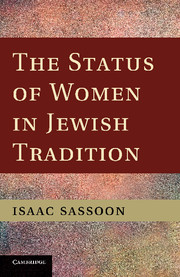Book contents
- Frontmatter
- Contents
- Preface
- Acknowledgements
- Glossary
- Abbreviations
- PART I MONOGAMY
- 1 The Sources
- 2 Pro-CD Arguments
- 3 Anti-CD Arguments
- 4 Indeterminate Arguments
- 5 Make-or-Break Argument
- 6 Which Way Does the Evidence Point?
- 7 Gen 1:27–29 Revisited
- PART II COMMANDMENTS (MIṢVOT)
- PART III INTRINSIC EQUALITY
- Conclusion
- Bibliography
- Index of Authors (Medieval & Pre-modern)
- Index of Citations from Rabbinic Literature
- Index of Names (Hebrew Bible)
- Index of Names (Talmudic)
- General Index
1 - The Sources
Published online by Cambridge University Press: 01 June 2011
- Frontmatter
- Contents
- Preface
- Acknowledgements
- Glossary
- Abbreviations
- PART I MONOGAMY
- 1 The Sources
- 2 Pro-CD Arguments
- 3 Anti-CD Arguments
- 4 Indeterminate Arguments
- 5 Make-or-Break Argument
- 6 Which Way Does the Evidence Point?
- 7 Gen 1:27–29 Revisited
- PART II COMMANDMENTS (MIṢVOT)
- PART III INTRINSIC EQUALITY
- Conclusion
- Bibliography
- Index of Authors (Medieval & Pre-modern)
- Index of Citations from Rabbinic Literature
- Index of Names (Hebrew Bible)
- Index of Names (Talmudic)
- General Index
Summary
The Damascus Covenant (hereafter CD) may be thought of as the constitution of the community which embraced it. CD outlaws polygyny on Pentateuchal authority and blasts those who permit it:
The builders of the partition (bone ha-ḥayiṣ) who go after ṣav – the ṣav is the preacher of whom it is said [Mic 2:6] Assuredly they shall preach – they are caught twice in fornication by taking two wives in their lives; also the principle of creation is [Gen 1:27] Male and female He created them, and those who entered the ark [Gen 7:9] Two by two did they enter the ark. And regarding the prince it is written [Dt 17:17] He shall not multiply wives to himself (CD 4:19–5:2)
Now the phrase ‘by taking two wives in their lives’ (laqaḥat shete nashim be-ḥayyehem) unmistakably echoes Lev 18:18: “ve-ishah el aḥotah lo tiqaḥ liṣror legallot ‘ervatah ‘alehah be-ḥayyehah” (literally: And a wife [or a woman] to her sister you shall not take [in marriage] to cause rivalry to uncover her nakedness upon her in her lifetime). It also seems clear that of the four scriptural texts adduced, it is Lev 18:18 that CD treats as the clincher, with the Genesis and Deuteronomy verses serving as back-up. In other words, it all hinges on the Leviticus verse, or rather on the way that verse is decoded. For Lev 18:18 is cryptic.
- Type
- Chapter
- Information
- The Status of Women in Jewish Tradition , pp. 5 - 8Publisher: Cambridge University PressPrint publication year: 2011



